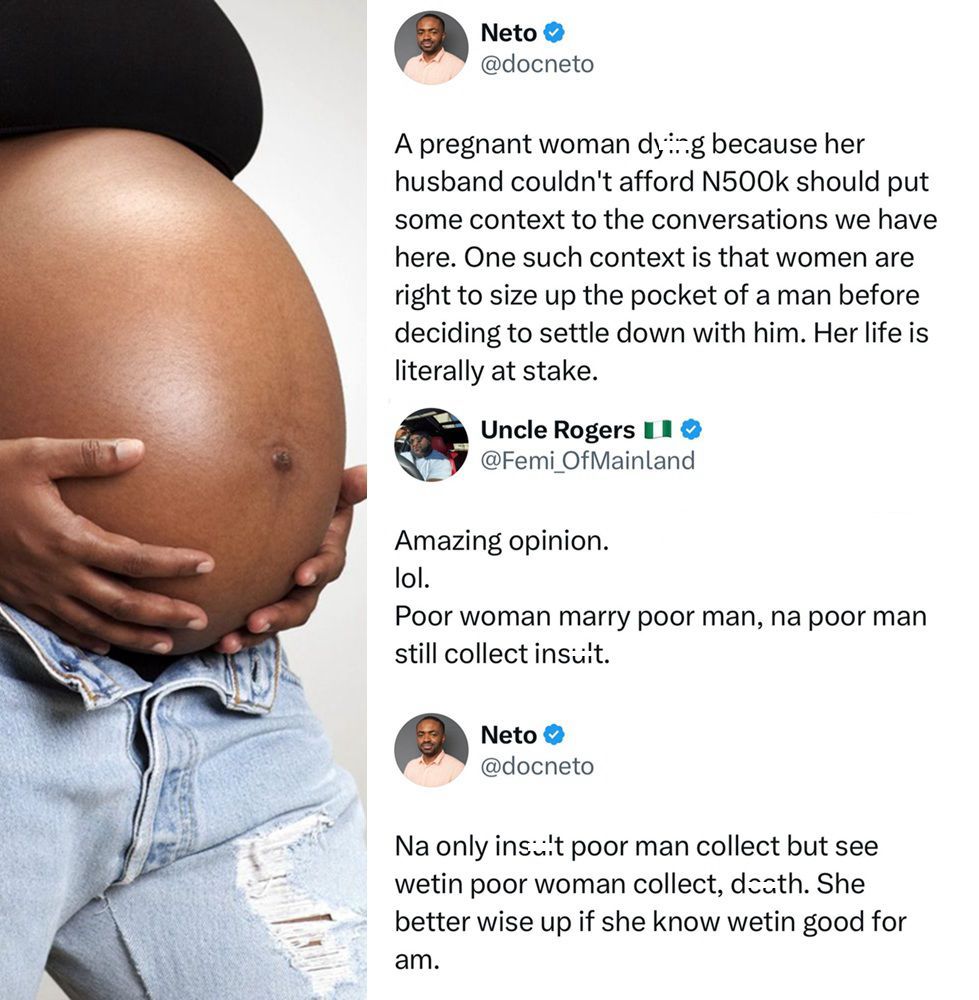
"Her Death Wasn't Just Tragic—It Was a Wake-Up Call": Nigerian Man Sparks Debate Over Financial Stability in Marriage After Pregnant Woman Dies Over N500k Hospital Bill

In a tragic and deeply unsettling incident that has sent shockwaves across Nigeria’s social media space, a pregnant woman reportedly died due to the inability of her husband to pay a N500,000 hospital bill. While the loss of life has left many mourning and angered by the country's failing healthcare system, the discussion has taken an unexpected turn—centered around the financial status of men in relationships and what women should prioritize before marriage.
A tweet by a Nigerian man, Neto (@docneto), has gone viral for stating bluntly, “A pregnant woman dying because her husband couldn't afford N500k should put some context to the conversations we have here. One such context is that women are right to size up the pocket of a man before deciding to settle down with him.”
His words, though piercing, echoed the sentiments of many who believe love alone is no longer enough of a foundation for marriage in a society where access to basic healthcare can mean life or death. The tweet, which has gathered thousands of likes and shares, drew both strong agreement and emotional backlash, making the situation not just a personal tragedy but a national conversation.
“Na only insult poor man collect but see wetin poor woman collect, death,” Neto added in a follow-up, highlighting the cruel contrast between societal shaming and the actual cost of poverty in Nigeria. Another user, Uncle Rogers (@FemiOfMainland), responded, “Poor woman marry poor man, na poor man still collect insult.” But the grim truth remained: while the man faced ridicule, the woman paid the ultimate price.
What would have been a straightforward tale of an avoidable maternal death turned into a public referendum on the financial responsibilities that come with marriage, especially for women. Many commentators are now questioning whether it's “gold digging” or simply “survival instinct” for women to assess a man’s financial capabilities before tying the knot.
In a country where maternal healthcare is often unaffordable and even emergencies require upfront payments before treatment, such tragic stories are not new. What’s different this time is how it has reignited the debate around love, money, and survival. Should a woman prioritize financial stability over emotional connection? Should marriage be approached as a partnership of shared economic goals, rather than a romantic bond alone?
The responses to Neto’s post suggest a hardening reality among many Nigerians: economic power is no longer a luxury—it’s a necessity. “People say money isn’t everything, but it’s something. A big something,” one commenter noted. “It’s the difference between life and death. Literally.”
Others argue that while the financial situation is critical, it’s unfair to place the burden solely on women to “choose better.” “The real villain here is a system that allows hospitals to turn away dying patients for lack of payment,” one user posted. “Let’s not blame the poor for being poor. Blame the government that makes poverty so deadly.”
But even amid the criticisms, the growing consensus is that romantic ideals are quickly becoming outdated in a society ravaged by inflation, unemployment, and a lack of social safety nets. One user summarized it harshly: “You can die loving a broke man. That’s the truth. You need to love wisely.”
The story has also exposed a class divide in public opinion. Those from more financially stable backgrounds were quick to support the idea of "pocket sizing" before marriage, while others, who saw themselves in the shoes of the deceased woman and her husband, felt attacked and marginalized. For many, the woman’s death wasn't just about finances—it was about the indignity of poverty and the helplessness of ordinary Nigerians in emergency situations.
The man in question—whose name has not been made public—has not commented. There is no doubt he is grieving. But he is also being judged harshly by some, who argue he had no business starting a family without the means to protect it. A brutal stance, perhaps, but one that reflects the stark realities of modern life in Nigeria.
Meanwhile, activists are using the momentum from the public outcry to call for systemic healthcare reforms. “No one should die because they can’t afford hospital bills,” said one health rights advocate. “This is a human rights issue, not just a marriage issue.”
Yet, the spotlight remains fixed on one uncomfortable truth: for women, marrying a man without means could cost them more than just comfort—it could cost them their lives. That truth, ugly as it is, now colors every conversation about love and commitment in a country where economic hardship is part of daily survival.
And so, what began as a sad report of maternal death has spiraled into a mirror reflecting Nigeria’s harsh economic and social conditions. It’s a call to action, not just for individuals to be financially prepared before starting families, but for society to take a long, hard look at the systems that punish the poor with death and turn love into a luxury only the rich can afford.


